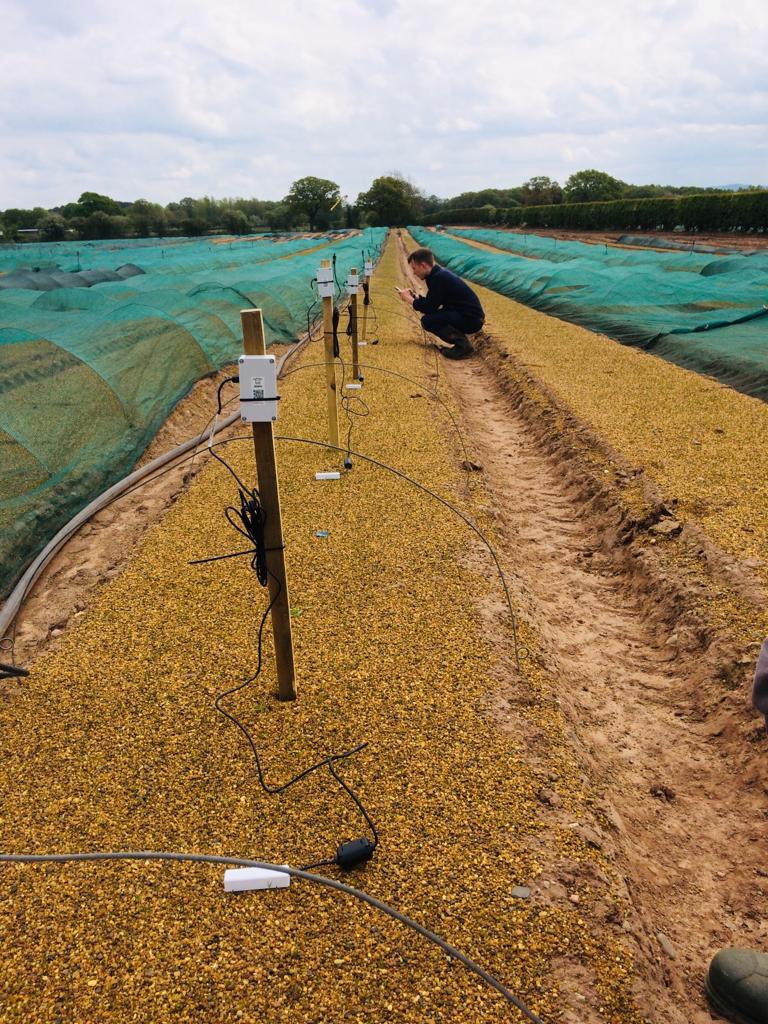Ant Surrage is a technical development specialist at agricultural supplier – and CHAP member – Fargro. We chatted about his passion for plant protection and his desire to make a difference in the world of agri-tech innovation.
How do you generally introduce yourself and the work you do?
My role is to develop the technical range of products Fargro market in the UK. These are generally plant protection products and predominantly biopesticides. ‘Develop’ encompasses a wide range of activities from moving products through various regulatory processes to working on-site with growers to reach maximum efficacy with the products in the field. Further to this, the technical range also includes smart sensors and precision agricultural/horticultural technologies, so part of my time is focused on developing these technologies and their uses in UK horticulture. The two strings of biopesticides and smart technologies complement each other excellently, the technologies enable growers to achieve consistent good efficacy with biopesticides and macrobiological controls.
What does a typical day look like for you and how has this been affected by the Coronavirus pandemic?
My day-to-day is very varied, (even during lockdown), it ranges from supporting regulatory and marketing processes right through to supporting growers with our products. Lockdown has given us a chance to progress with various regulatory projects and has also challenged us to really embrace remote support via cloud-based platforms like ZENSIE by 30MHz. We have groups of growers and agronomy teams we are working with to track pest and disease progression this season against environmental conditions as well as supporting growers in a transition towards digitising some of their non-digital metrics such as crop walk data.
What do you find most challenging about your job/field?
Because individual growers and individual growing organisations vary so much, I would say the biggest challenge is figuring out how each individual could benefit best from new technologies. There is no one size fits all solution, although the components to collect environmental data may be the same the interpretation of the data to solve a given problem and then how you present and action that insight differs for everyone. Therefore, projects need to have a personal element to them to ensure a grower gets maximum benefit from a technology, be they smart-tech or a biopesticides/macrobiological control.
CHAP is one of the four Agri-Tech Centres for Innovation. Have you seen any benefits from interacting with these organisations?
The projects and knowledge exchange events the four Agri-Tech centres have facilitated have taught me a lot and have been excellent places to network and grow a contact base. This has driven innovation for us personally so will have doubtlessly driven innovation and adoption across the wider UK agriculture industry. I hope that this networking will continue so that the energy that comes from it can be channelled through projects to solve some of the key issues faced by the industry currently.
What are your biggest professional challenges?
A big challenge at the moment is how we refill the toolkit of growers to control various pests and diseases as we see conventional chemical availability decrease. This challenge is exacerbated by the issue of regulation and biopesticides having to follow the same pathway as conventional chemistry. It will often mean that although we think biopesticides could help to solve some of the key pest and disease issues currently present, they cannot legally be applied and the cost of producing the data to gain approvals on other major crops is often not viable for the companies we work with.
What do you think will be the biggest area of focus/biggest change in UK agriculture over the next five years?
I will answer on my specific areas of interest as I am sure there will be many issues outside of my bubble that will be hugely important, but I am not best placed to comment on these. The biggest challenge will be how can IPM practices currently being practiced by growers be optimised through innovative new technologies to drive productivity while moving towards net-zero carbon so that an IPM programme can come close to or match the efficacy of conventional chemistry.
Do you have a mentor or someone whose work inspired you? Who were they and how have they influenced what you do?
I have been very lucky in the early years of my career to be invited to speak at several events which enabled me to network with lots of great individuals many of whom have offered me advice and shared knowledge over coffee breaks and event lunches. There does tend to be a bit of a disconnect from the science I see at conferences and realising the business potential of products which also ultimately means supplying a cost-effective solution to growers. On that, I am again, very lucky to have Richard Hopkins as the managing director of Fargro, his extensive experience, and knowledge of the technologies and communications market has been vital in my development.
What would you like to be remembered for?
It would be great to be thought of as someone that played a small part in this technology/digital revolution we are seeing in agriculture and horticulture. If I can play my part and help our grower base at Fargro implement new technologies and derive insights and benefits from them be they biopesticides, smart-tech, or whatever is around the corner, I would be pretty happy with that!
CHAP member Fargro has more than 70 years’ experience of supporting growers, with expertise across every horticultural sector. It is a leading supplier of biological crop protection and integrated pest management (IPM) products for horticulture.
If you have any questions about CHAP, our Membership Scheme, or are interested in working with us on a specific project, then please send us an email at enquiries@chap-solutions.co.uk
Please note, the opinions expressed in this article are the author’s own and do not necessarily reflect the views or opinions of CHAP.












